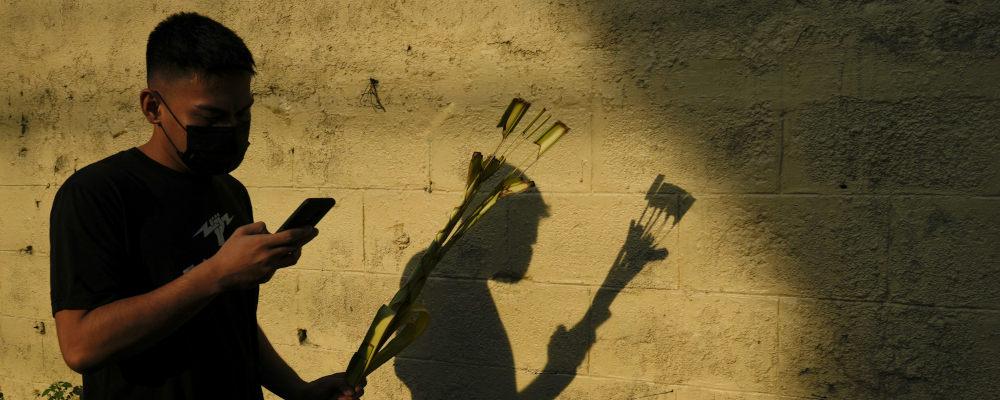Aging happens so gradually in real time that sometimes you need to go back and look at old photographs to notice how much you have changed. That new patch of grey, the subtle slump of the shoulders, those crow’s feet: when did they happen? Social breakdown can be similarly imperceptible as it’s happening, but then one day you wake up and you can’t remember exactly when the coarseness set in. Last week the National Opinion Research Center at the University of Chicago and the Wall Street Journal provided a side-by-side snapshot of decline in the latest in a series of surveys tracking Americans’ attitudes towards civic virtues, and the comparison is not flattering.
The new polling was presented beside responses from 1998, which was—this may come as a shock to those of us who remember it—a quarter of a century ago. In case you weren’t around then, in 1998 Bill Clinton was halfway through his second term as president and Jean Chrétien was exactly halfway through his time as prime minister. Most people didn’t have cell phones, email was a novelty, and the internet was mostly text and accessed physically at fixed monitors.This is what it looked like—Google wasn’t launched until late that year. More than half of Americans had never been online and they didn’t feel like they were missing out.
Since then, the NORC-WSJ survey reports, a lot has happened in America, none of it good. In the last 25 years, the number of respondents who say that patriotism is “very important” to them has declined from 70 percent to 38 percent. For “religion,” the number declined from 62 percent to 39 percent; “having children,” halved from 59 percent to 30 percent; “hard work” is down from 84 percent to 67 percent; and, after a brief spike in 2019, “community involvement” fell from 47 percent to 27 percent. The only thing that has increased in importance for Americans, from 31 percent to 43 percent, is “money.”
That is a picture of a society in free fall. It is possible that the latest survey represents an anomaly, a temporary pandemic-induced malaise, but I don’t think so. The results confirm too much of what we see around us and are too consistent with what has been reported for years about declining birth rates and church attendance and increased political polarization and social alienation. Some of the root causes are clear to anyone with eyes to see and ears to hear them, even if there is no political will to act against them. But what else has been going on to explain the latest numbers? Here are three possible answers.
First, and most obviously, the Americans that answered the survey in 1998 are not the Americans that exist today. In 1998, the oldest respondents were part of the Greatest Generation, the men and women who were among the 16 million Americans who served in the Second World War or the many more who maintained the home front. Most of them also had memories of the Great Depression or were shaped by their own parents’ experiences of extreme deprivation in both the old and the new world.
It is not surprising that a generation that grew up with mass unemployment and food shortages in a cash society without access to easy credit cultivated habits of thrift. If you knew a parent or grandparent from that generation, you will have stories about their determination to scrimp and save and their horror of waste. They passed some of this discipline on to their children, but skills like sewing and darning and stretching leftovers into multiple meals were quickly abandoned in a global market awash with cheap imported clothes, year-round vegetables,It was with good reason Steinbeck used war profiteering from shipping Salinas Valley beans to Europe to illustrate Cal’s moral obtuseness in East of Eden. and factory farming.
When that generation died, a way of life informed by the surveyed virtues died with them. Replacing them in the demographic pool with Millennials and Gen Z, who are the least likely to report that these virtues are “very important” to them was a major loss, not just to the survey results but to America. But this is a superficial answer. It remains to explain why earlier generations were more patriotic, faithful, hard-working, family-focussed, and community-involved than we are today.I say “we” even though the survey was of Americans because I would be surprised if the trajectory, if not yet the absolute numbers, were as dire here. And we have another reason to care: as Canadians, we are a branch of a 500-year-old Anglo-American civilisation. If the trunk falls, we go down too.
If war and want are stern instructors, then a big part of why we have got so much worse is that things have got so much better. Material prosperity and the wealth of choice it brings may feel like a good thing, and in some cases it is, but it also means more room for bad choices. If you grew up in the 1930s in one place, surrounded by friends and family, your choices for marriage, work, and entertainment would have been much more limited, but that also made it much harder to choose foolishly, including choosing not to choose at all.
With inexhaustible choice in all these things, it takes extraordinary discipline to choose wisely. Why settle down when there are dating apps full of prospects? Why get married when you can have “safe” sex (as though the natural consequence and purpose of sex, children, were something “unsafe”)? Why incur the cost of a second or third child when it means pricing yourself out of family vacations in Europe? Why join a bowling league or a choir when you can stay home and succumb to Netflix? Why go to church when there is football on TV, and there’s nobody who will notice if you aren’t there?
In the post-war boom, social mobility and physical mobility went hand in hand. Air travel, Eisenhower’s interstate highway system, cheap cars (and subsidised roads), and flexible work arrangements have made it normal for people to move cities, states, and even countries not because work is unavailable locally, but because better work is available elsewhere. Migration driven not by absolute need but by convenience and comparative advantage has created unprecedented economic growth, but that material gain has come at the expense of social dislocation in the great uprooting of the West.
It shouldn’t be surprising that people who don’t live where they grew up are less into “community involvement,” or that people who don’t feel local connections will eventually lose the feeling of connection to their country. Patriotism, the sense that we are part of a common project bigger than ourselves, is just the sense of community projected to the next natural level. Nor is it surprising that young people without close family to support them aren’t having children. Some self-described conservatives mocked Hillary Clinton’s book It Takes a Village, but the lesson that raising a child requires community was deeply conservative. Destroy the village, destroy the family.

New technologies, and above all wireless technology, found this transient society desperate for connection but have left it even more isolated and divided. We tell ourselves that we can talk to anyone, anywhere, anytime, but that it is poor compensation for the companionship that humans need here and now. A lot has changed since 1998, but the thing a time-traveller would notice first if he were dropped into a coffee shop today is the ubiquity of screens. People waiting for their orders would be scrolling through their phones and most of the people sitting down would be staring at computers, many blocking out the world with headphones. Almost nobody would be talking. In many cases couples and families would be staring dumbly at their own devices, or glancing at the phone on the table as though willing it to stimulate them.
Given that the survey’s timeline tracks the introduction of cell phones, email, and the internet, and that the downward trend accelerates after the introduction of smartphones and social media, it is hard not to draw a causal inference. We know about the skyrocketing levels of anxiety, neurosis, body dysmorphia, and moral confusion that followed the introduction of social media. And we know about its effect on the impressionable minds of children whose brains will now be maladapted for life (not that we are planning to do anything about it). It would be incredible if this weren’t part of our social collapse.
Neglect for the minds and character of children brings me to my third answer, which is the hollowing out of the North American education system. Although this was an American survey, I doubt the results would be more encouraging in Canada, and for the same reason: both countries have undergone a multi-generational campaign against the idea that education should inculcate personal and civic virtue or convey “a grand narrative, designed to explain how the modern state grew and to build a sense of nationalism.”
That last quote, by the way, comes from a recent Globe and Mail opinion piece by the much-lauded Canadian historian and journalist, Charlotte Gray. And in case you were wondering, she didn’t mean “a grand narrative” and “a sense of nationalism” as good things. The point of her article was to applaud history teachers who reject the traditional story of Canadian history. “Today’s history classes,” she gushes, “highlight a diverse, multicultural and fragmented history, in which Jacques Cartier, Mackenzie King or Lester Pearson may or may not have walk-on parts.” This is a “radically different approach to history than the one I absorbed in my own education, during which teachers drew on the past to shape national pride and literary skills.” And this, apparently, is a good thing.
In another recent article, which could have been penned as a rebuttal to Gray, former U.K. Supreme Court judge Jonathan Sumption explained why the traditional way of teaching history matters, and why its repudiation by the teaching profession is so alarming.As the author of a planned five-volume history of the Hundred Years War, of which four volumes have so-far been published, Lord Sumption brings his own formidable credentials to the debate “To reject what is wonderful and fascinating about humanity in favour of a monochrome view of the past, dictated by current priorities, is obsessive and fanatical. It is also very bad history.” Equally important, a sense of a shared history—”a grand narrative,” if you will, that is a source of “national pride”—is a precondition for living and working together in a democratic society.
Sumption quotes French historian Ernest Renan’s 1882 Sorbonne lecture, “What is a Nation?” in which Renan rejected the then-popular idea that a nation must be built on a common race, religion, or language—an idea that in extreme and perverted forms would lead to the profane atrocities of the 20th century. For Renan, “[n]ational identity did not depend on ethnic or linguistic solidarities, but … on a consciousness of having done great things together in the past, and wanting to do more of them in future.” In Renan’s words, “avoir fait de grandes choses ensemble, vouloir en faire encore.” The message is clear: when a society stops teaching its history as a shared story, it doesn’t mean the end of history, but it may mean the end of the society.
Each of these three hypotheses—generational change; prosperity and technology; and the corruption of the education system—could alone explain the results of the NORC-WSJ survey, but I suspect the answer lies in a potent combination of all three. If I am right, then it is too late to reverse the slide. The Greatest Generation isn’t coming back; we are hell-bent on pursuing economic growth and technological convenience at all costs; and three generations into the Gramscian capture of our education departments, we probably couldn’t return intellectual and moral rigour to our schools even if we tried (which we haven’t).
The NORC-WSJ survey may not offer hope, but it is a good reminder that it wasn’t always this way. Yes, there have always been rude strains and rough edges, but the sterile carnival of lonely phone carousing is something new. Urbanisation on a scale of millions created the anonymous crowd more than a century ago, but it was only recently that the crowd found itself lost alone in a headphone world chasing clicks into a flickering algorithmic labyrinth of dead-end ads. The only question is how quickly we will follow our impulsive fantasies into the voluntary prison of all-encompassing unreality that global tech companies are preparing for us, a shimmering unsociety where there will be no patriotism, no religion, no children, and no community.
Recommended for You

Michael Kaumeyer: Polite decline: Canada’s aversion to being our best is holding us back

Howard Anglin: Lament for a Lament

‘A place where anybody, from anywhere, can do anything’: The Hub celebrates Canada Day

The state of Canada’s economy halfway through 2025




